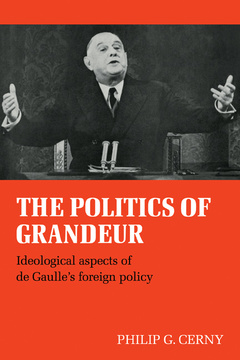Description
The Politics of Grandeur
Ideological Aspects of de Gaulle's Foreign Policy
Author: Cerny Philip G.
De Gaulle was the first major Western leader to pursue a foreign policy designed consistently to break the vicious circle of the Cold War.
Language: English
Subject for The Politics of Grandeur:
Approximative price 40.18 €
Subject to availability at the publisher.
Add to cart
Publication date: 10-2008
336 p. · 15.2x22.9 cm
336 p. · 15.2x22.9 cm
Description
/li>Contents
/li>
De Gaulle was the first major Western leader to pursue a foreign policy designed consistently to break the vicious circle of the Cold War and the straitjacket of the nuclear balance of terror between Russia and the United States. At the same time, he sought to establish in France a new set of institutions designed to break another vicious circle: that of the divisive conflicts between French social groups and political parties, which led to weak governments and an ineffective state. This book studies the link between these two aims, both by examining de Gaulle's political aims and style in a political and cultural context, and by looking first at French policy towards the Atlantic alliance, and then at the impact of de Gaulle's foreign policy on domestic politics. As a result, many of the orthodox notions about de Gaulle are questioned.
Part I. Ideological roots and purposes of de Gaulle's foreign policy: 1. The personal equation: psychology, socialisation and culture; 2. The philosophical roots of Gaullism; 3. The dynamics of Gaullist ideology: de Gaulle's theory of leadership and political action; 4. National consciousness and the role of France in world politics: the Gaullist perspective; 5. Foreign policy leadership and national integration: a framework for analysis; Part II. The grand design and foreign policy praxis: a case study in Atlantic relationships and the domestic impact of Gaullist policy; 6. Structure and development of the grand design; 7. Raising the Atlantic question, 1958–62; 8. Atlantic divergences: the phase of reactive assertion, 1963–6; 9. Convergence and reconciliation, 1966–9; 10. The impact of Gaullist policy on political change in France: consensus-building and the routinisation of authority.
© 2024 LAVOISIER S.A.S.
These books may interest you

De Gaulle, Israel and the Jews 160.25 €

Franco-Israeli Relations, 1958-1967 177.01 €


